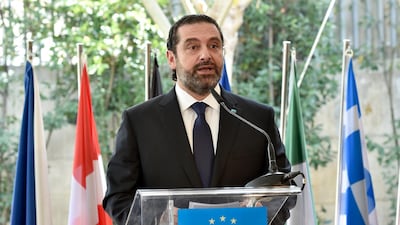Lebanon plans to implement reforms in the coming months to unlock $11 billion of pledged donor aid that were secured at the Cedre conference in Paris last year, the country’s prime minister said.
The Lebanese government, formed nine months after the May parliament elections, is also working to approve the fiscal budget which will be “realistic” with the aim of eliminating waste, Saad Hariri said.
“There is an emphasis on approving the laws related to Cedre and during a few coming months, Cedre reforms will be implemented because now we have consensus among all political parties,” he said.
Lebanon, the third most indebted country in the world, is struggling to control public finances as a result of ballooning public debt, anemic economic growth and the strain from hosting over a million Syrian refugees. Political bickering had delayed the formation of a new government and fuelled economic uncertainty.
Donors from various countries pledged at the Cedre investment conference in Paris in April last year to provide Lebanon with more than $11bn in soft loans to mainly fund infrastructure projects.
The pledges were linked to reforms, which include lowering the fiscal deficit by 1 percentage point annually over five years among other measures.
Lebanon’s ability to pay its bondholders, should there be a liquidity crunch, prompted Moody’s Investors Service to downgrade its rating further into junk category in January.
Mr Hariri said he wants tourism to account for as much as 50 per cent of GDP from about 20 per cent. The economy which has been growing at about 1 per cent for the past seven years and is projected to expand 1.4 per cent this year according to the International Monetary Fund , should expand at a rate of 5 to 6 per cent outpacing the growth of public debt that reached $85.3bn at the end of January.
That strategy had underpinned the country's debt management before the Arab uprisings in 2011 and the collapse of oil prices in 2014, which took their toll on Lebanon's economy.
Lebanon's 150 per cent debt to gross domestic product ratio is burdened by recurring fiscal deficit with debt servicing costs and public sector wages eating into its revenue, which have languished because of tepid economic growth. The country's gross financing needs exceed 30 per cent of GDP, among the highest in the world, according to Moody's.
Lebanon’s debt to GDP ratio could balloon to 180 per cent by 2023, if the government does not undertake the necessary reforms to narrow its fiscal deficit, which may reach 10 per cent of GDP amid the current geopolitical tensions, the IMF said in February last year.
Qatar pledged to buy $500 million worth of Lebanese bonds in January, while Saudi Arabia said it wants to support Lebanon "all the way".
The Lebanese government plans to expand and privatise its airport and is working with the IMF to implement the project on the basis of built-operate-transfer investment model, the prime minister said.

